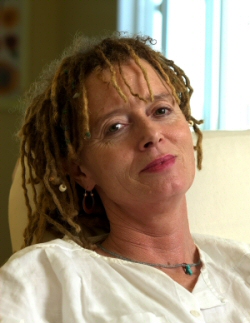Anne Lamott was a daydreamer in school. "It's how novels get started: You wonder," she said during a reading at my local independent bookstore last month. On tour to promote her eighth novel, Imperfect Birds, the third in a trilogy including Rosie and Crooked Little Heart, Lamott spoke to a packed room about "how we come through our survivable losses" -- substance abuse, perfectionism, adolescence -- and how these themes infuse her stories.
"You can't get well if you have a great tragedy inside, until you get it out," she said. Articulate and humorous with more than a hint of 'spacey', Lamott joked, "I took lots of acid when I was young. I'm sure you can't tell!"
Lamott's teen character Rosie was inspired by the author's own experiences as a teenage tennis champion full of perfectionist ideals, and how that competition eventually broke her spirit. Rosie's story also represents the pressures young women currently face in upper-middle class Marin County, where Lamott has heard it said that "exceptionalism is the new normal," where (junior) high schools are plagued with every drug for sale -- from Cocaine to Ecstasy to Ritalin, and where angry girls are "taught to have half of their emotions."
Like many of Lamott's novels and nonfiction books -- three including the subtitle 'Thoughts on Faith' -- Imperfect Birds aligns with her theme that "in any situation there's light at the end of the tunnel." Like her instructional book on writing, Bird by Bird, Lamott also shed light on the writing process, from inspiration to distraction.
"It's not in anyone's best interest if you write," she said. "In fact, it's in everyone's best interest that you don't write!" She warned writers not to believe in waiting. If you do, you'll never write: "When you're 80 and you never got around to it, it's gonna hurt!"
Her father was a writer who instilled in her the development of discipline through habit. Currently Lamott sets aside 4 hours daily, knowing at least 2 1/2 hours of writing will happen -- including "false starts, bad drafts and not knowing what you're doing." Maybe six months of writing doesn't culminate in anything useful, but you've gotten to know your characters - what they do in difficult circumstances, what they like to read, how they respond to one another.
How does she get a book written?
"I do a draft and then I take out the lies - the cutest possible stuff and the brilliant thoughts. From blank paper a story emerges."
Dear Reader,
How do you translate your "survivable losses" to the blank page?

No comments:
Post a Comment